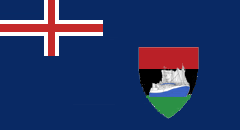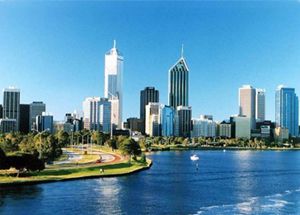Avinapolis
 Flag | |
|---|---|
| Not Yet Available Map | |
| Motto Excelsior | |
| Anthem God Save the King | |
| Capital | Avinapolis |
| Official Language(s) | English |
| Government Royal Governor | Sir Simon Greaves |
| Population | 1,562,102 |
| Gross Home Country Product Total Per Capita |
2005 (est. in USD) $92,337,411,322 $59,111 |
| CHDI (2006) | 0.952 (very high) |
| Currency | Oceania Pound (C£) (OCP) |
| Internet TLD | .oc, .az |
Avinapolis is a royal crown colony of the United Kingdom of Oceania located within the Verdant Archipelago to the north of the cluster directly opposite the island of Jacksonton. Granted to the United Kingdom in recognition of the great role played by the country in the discovery and improvement of the Verdant Archipelago, the colony and its eponymous - and largely co-terminus - capital city serve as important cultural, economic, political, and defence links between the Verdant Archipelago Union and the United Kingdom, linked together in a greater Commonwealth.
Contents
History
For much of its history, the island of Avinapolis lay claimed by Jacksonton but unsettled owing to the unique and precarious situation on the island caused by its indigenous flora and fauna. However, in 2005 the then Commonwealth of Azazia re-discovered the archipelago and its European colonies, abandoned in the 19th century due to the difficulties in transportation from the threats posed by the local flora and fauna.
As part of a treaty that established relations between the two states, Jacksonton ceded the island to the Commonwealth, which then set about carving out a permanent settlement on the island, which features a deep and large natural harbour seen as strategically useful by the Ministry of Defence and the Royal Navy.
In 2005, the United Kingdom organised the settlement as Avinapolis, named for former President and Minister of Foreign Affairs Matthew Avin. The city existed within the larger territory known as the Royal Crown Colony of the Verdant Archipelago, which consisted also of several islands ceded by the formerly independent city-states of the archipelago.
In 2006, after the re-oganisation of the United Kingdom of Azazia into the United Kingdom of Oceania and the subsequent formation of a commonwealth between the Verdant Archipelago Union and the United Kingdom the Royal Crown Colony of the Verdant Archipelago was renamed the Royal Crown Colony of Avinapolis. Accordingly, all the United Kingdom’s remaining colonial possessions were returned to the VAU with the exception of Avinapolis and two small Royal Navy and Royal Air Force bases on two small islands located at the head of two deep-water shipping channels within the heart of the archipelago.
Economy
 The Avinapolis Waterfront |
|---|
Given the desire for rapid growth by former constituent city-states of the VAU, the need for financial capital and support infrastructure became readily apparent to the Colonial Office and its predecessor the Ministry of Colonial Affairs. Consequently, the UK government appealed and advertised to domestic businesses and corporations about the lucrative opportunities in the archipelago and since that time the city of Avinapolis has experienced economic growth higher than the national average.
Much of the city’s economic base comes from the financial sector, as UK banks and credit unions offer substantial loans to the developing nation and its private sector businesses. Additionally, many of the more technologically sophisticated items requisite for developing the islands require production facilities more advanced than currently present within the islands – though available to Oceanian immigrants to Avinapolis. Consequently, while many low-cost goods are manufactured in cities such as Jacksonton, Veragrad, and Saxburg the UK city of Avinapolis contributes many of the higher-cost consumer goods demanded by the rapidly modernising VAU population.
Also of great import to the local economy is the presence of the Royal Navy, which occupies a significant grant of land outside the city known as HMNB Avinapolis. Prior to the establishment of the colony the bulk of the United Kingdom’s Indian Ocean Fleet called Port Blair in the Indian Islands its homeport. However, since 2005 the Royal Navy has actively been dredging and fortifying the deep natural harbours of the city for use as the eventual headquarters for the Indian Ocean Fleet. Thus, the presence of Royal Navy personnel as well as the need for construction of minor surface warships has created a strong naval manufacturing industry based in Avinapolis. Additionally, the developing home guard fleet of the VAU requires, in many cases, the more advanced yards of the United Kingdom – some work subsequently being shifted to Avinapolis given its closer proximity to the eventual operating force, the VAU navy.
Politics
A non-self-governing territory, the colony receives legislation directly through the Parliament in Imperium, and while not represented through a sitting MP the colony does send non-official representatives to brief Parliament on the concerns and opinions of the colony. Currently, executive power in the colony is exercised through the Royal Governor
Given the overpopulation of the Home Islands, a remarkable one and a half million individuals have immigrated to the island from other territories in the United Kingdom, most importantly from the Home Islands. As such, many within the colony have agitated for some degree of local self-government, a request partially fulfilled by Parliament through the planned creation of a unicameral House of Assembly, whose tasks will be to present official advisements to the Royal Governor, who will then appropriately advise the Sovereign and Parliament.
Environment
Most of the native flora and fauna of the Verdant Archipelago is lethal to humans; the islands host a unique protein upon which the native populations have become dependent and thus ensuring the threatening species do not leave the waters or lands of the archipelago. Among the most dangerous creatures remain what locals have termed kraken, a particularly large species of predatory squid that feature powerful tentacles and a pack-hunting mentality, which when combined with their ferocious appetite and aggressive nature make them a threat to not just isolated persons but also to ships and watercraft.
Also dangerous are the numerous species of invasive plants, which grow root systems at a prodigious rate that allows them to rapidly reclaim deforested regions of the islands throughout the archipelago. Overtime they have evolved unique systems to counter human expansion, some including poisonous explosive needles while others exude toxins as tree sap. Their rapid regenerative qualities make them a drain on local construction companies who must frequently combat the flora when expanding the city onto new frontier land.
Culture
Avinapolis, as a settler colony of the United Kingdom, exhibits a similar culture to that of the Home Islands, particularly the urban regions near Imperium, Philadelphia, and Breningrad in the eastern most islands. Many, however, have found that Avinapolis does not cure their need for expansive, ground-hugging lifestyles as the native flora has forced the city and its investors to hastily build a city of high-rises and skyscrapers seeking to take advantage of the security of the air rather than the insecurity of ground-dwellings.
